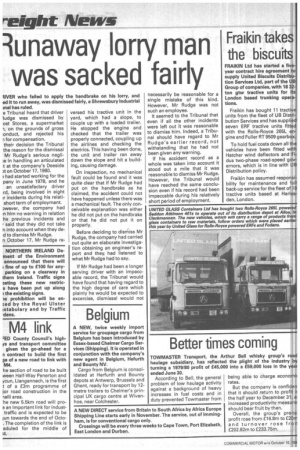Runaway lorry man was sacked fair!
Page 8

If you've noticed an error in this article please click here to report it so we can fix it.
IIVER who failed to apply the handbrake on his lorry, and ad it to run away, was dismissed fairly, a Shrewsbury Industrial mai has ruled.
e Tribunal heard that driver tudge was dismissed by ost Stores, a supermarket on the grounds of gross :onduct, and rejected his ifor compensation.
their decision the Tribunal the reason for the dismissal Mr Rudge's serious negli;e in handling an articulated t at the company's Deeside )t on October 17, 1980.
had started working for the pany in June 1978, and he
an unsatisfactary driver rd, being involved in eight :r incidents during his relatishort term of employment. 3wever, the company had ,n him no warning in relation he previous incidents and said that they did not take n into account when they ded to dismiss Mr Rudge.
n October 17, Mr Rudge re versed his tractive unit in the yard, which had a slope, to couple up with a loaded trailer. He stopped the engine and checked that the trailer was properly connected, coupling up the airlines and checking the electrics. This having been done, the unit and trailer ran away down the slope and hit a building, causing damage.
On inspection, no mechanical fault could be found and it was quite clear that if Mr Rudge had put on the handbrake as he claimed, the accident could not have happened unless there was a mechanical fault. The only conceivable explanation was either he did not put on the handbrake or that he did not put it on properly.
Before deciding to dismiss Mr Rudge, the company had carried out quite an elaborate investigation obtaining an engineer's report and they had listened to what Mr Rudge had to say.
If Mr Rudge had been a longer serving driver with an impeccable record, the Tribunal would have found that having regard to the high degree of care which plainly he would be expected to excercise, dismissal would not necessarily be reasonable for a single mistake of this kind. However, Mr Rudge was not such an employee.
It seemed to the Tribunal that even if all the other incidents were left out it was reasonable to dismiss him. Indeed, a Tribunal should have regard to Mr Rudge's earlier record, not withstanding that he had not been given any warning.
If his accident record as a whole was taken into account it stood out a mile that it was reasonable to dismiss Mr Rudge. However, the Tribunal would have reached the same conclusion even if his record had been impeccable during his relatively short period of employment.
























































